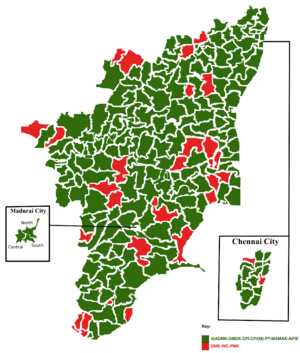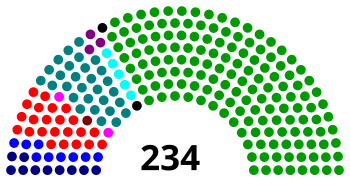| |||||||||||||||||||||||||||||||||||||||||||
All 234 seats in the Legislature of Tamil Nadu 118 seats needed for a majority | |||||||||||||||||||||||||||||||||||||||||||
|---|---|---|---|---|---|---|---|---|---|---|---|---|---|---|---|---|---|---|---|---|---|---|---|---|---|---|---|---|---|---|---|---|---|---|---|---|---|---|---|---|---|---|---|
| Turnout | 78.29% ( | ||||||||||||||||||||||||||||||||||||||||||
| |||||||||||||||||||||||||||||||||||||||||||
 | |||||||||||||||||||||||||||||||||||||||||||
| |||||||||||||||||||||||||||||||||||||||||||
The Fourteenth Legislative Assembly Election was held on 13 April 2011 to elect members from 234 constituencies in the Indian state of Tamil Nadu. Results were released on 13 May 2011. Two major parties Dravida Munnetra Kazhagam (DMK) and All India Anna Dravida Munnetra Kazhagam (AIADMK) faced the election as coalitions of multiple political parties: DMK front consisted of 8 parties and the AIADMK of 11 parties. Vijayakanth's Desiya Murpokku Dravida Kazhagam (DMDK), which had contested the previous elections independently, allied with the AIADMK coalition. Marumalarchi Dravida Munnetra Kazhagam boycotted the election following a disagreement with Jayalalithaa over seat-sharing. The outgoing Karunanidhi government was noted for the construction of new assembly building in Chennai, execution of various developmental projects, and implementation of programmes including free health care for the poor and issuance of a range of freebies such as color television to all. However, these were heavily overshadowed by other major issues such as incessant power cuts in households and industries, excessive sand mining, increasing prices of essential items, 2G spectrum case and undue influence of Karunanidhi's extended family in various aspects of Tamil politics and business and even media.
The election commission enforced stringent measures to curb the widespread abuse of power to bribe voters that were common in previous elections; it also imposed strict campaign discipline by imposing the 10 PM curfew. The commission headed by the chief election officer Praveen Kumar was commended for conducting the election strictly and fairly. The election recorded the highest polling ever in the state - 77.8% of the total electorate voted in the election surpassing 76.57% polled in 1967 election.
AIADMK front won the election-winning in 203 constituencies; the AIADMK party alone secured a massive majority in a landslide by carrying 150 seats and became eligible to form the government without requiring the support of its coalition partners. DMDK won 29 seats, more than the 23 seats won by DMK, and opted to serve as the official opposition party. Political analysts concluded that the election was a referendum on the outgoing DMK government and the powerful anti-incumbency sentiment helped the AIADMK coalition. J. Jayalalithaa along with 33 ministers was sworn in as the Chief Minister of Tamil Nadu for the fourth time on 16 May 2011 by the governor Surjit Singh Barnala.
- ^ "Challenge is to conduct peaceful polls in West Bengal: CEC". Sify. 4 February 2011. Archived from the original on 20 October 2012. Retrieved 27 February 2011.



